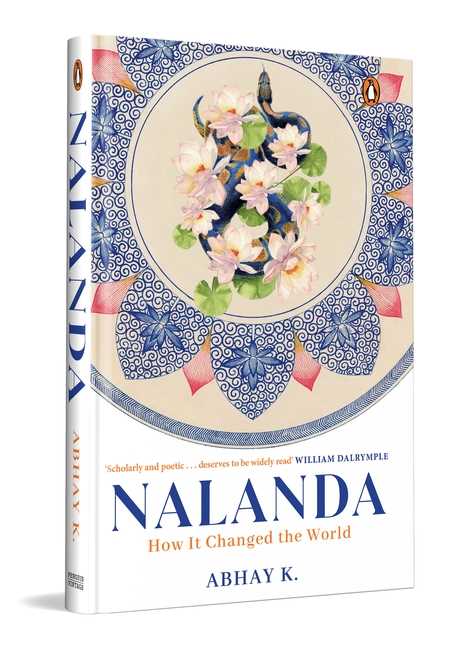
‘Nalanda reimagined’
In Nalanda: How It Changed the World, poet-diplomat Abhay K crafts a luminous and deeply researched tribute to one of India’s most enduring intellectual legacies. Drawing on historical records, archaeological insights, and poetic reflection, the book chronicles the rise, flourishing, and tragic destruction of Nalanda Mahavihara – widely regarded as the world’s first residential university.
Structured across eight chapters, the narrative traces Nalanda’s evolution from a modest vihara in honour of Sariputra to a sprawling monastic university that shaped global thought for over seven centuries.
Abhay K’s account begins with the patronage of Emperor Kumaragupta I and spans the Gupta, Pala, and Harsha periods, contextualising Nalanda’s growth within the broader currents of Buddhist philosophy, royal diplomacy, and transregional scholarship.
What sets this work apart is its interdisciplinary lens. Abhay K deftly weaves together Buddhist metaphysics, astronomy, medicine, mathematics, and linguistics, showing how Nalanda’s curriculum prefigured many principles of modern education.
The book draws compelling parallels between Nalanda’s pedagogical ethos and contemporary frameworks such as India’s National Education Policy (NEP 2020), underscoring the relevance of inquiry-based learning, meritocracy, and internationalisation.
The chapters on foreign scholars - particularly the pilgrimages of Xuanzang and Yijing – are among the book’s most evocative. Through lyrical prose and historical rigour, Abhay K reconstructs their journeys, illuminating Nalanda’s role as a beacon of cross-cultural exchange.
The vivid portrayal of Dharmaganja, Nalanda’s legendary library, and its tragic destruction by Bakhtiyar Khilji in 1193 is both heartbreaking and symbolic of the erasure of centuries of accumulated wisdom.
Equally poignant is the author’s personal connection to the site. Born near the ruins of Nalanda, Abhay K brings an authenticity and reverence that elevate the narrative beyond academic historiography. His poetic interludes – short verses scattered throughout the text – offer meditative pauses that encapsulate Nalanda’s spirit of inclusion, enlightenment, and resilience.
The book also engages with Nalanda’s global legacy, tracing its influence on institutions from Sri Lanka to Brazil, and reflecting on the modern revival of Nalanda University in Bihar.
In doing so, Abhay K positions Nalanda not merely as a historical artefact but as a living idea - one that continues to inspire educational reform, cultural diplomacy, and intellectual pluralism.
For readers invested in South Asian history, Buddhist heritage, or the future of higher education, Nalanda: How It Changed the World is essential reading. It is a scholarly yet accessible work that bridges past and present, offering both a chronicle and a call to reclaim India’s ancient knowledge systems.
Email : daanishinterview@gmail.com
‘Nalanda reimagined’
In Nalanda: How It Changed the World, poet-diplomat Abhay K crafts a luminous and deeply researched tribute to one of India’s most enduring intellectual legacies. Drawing on historical records, archaeological insights, and poetic reflection, the book chronicles the rise, flourishing, and tragic destruction of Nalanda Mahavihara – widely regarded as the world’s first residential university.
Structured across eight chapters, the narrative traces Nalanda’s evolution from a modest vihara in honour of Sariputra to a sprawling monastic university that shaped global thought for over seven centuries.
Abhay K’s account begins with the patronage of Emperor Kumaragupta I and spans the Gupta, Pala, and Harsha periods, contextualising Nalanda’s growth within the broader currents of Buddhist philosophy, royal diplomacy, and transregional scholarship.
What sets this work apart is its interdisciplinary lens. Abhay K deftly weaves together Buddhist metaphysics, astronomy, medicine, mathematics, and linguistics, showing how Nalanda’s curriculum prefigured many principles of modern education.
The book draws compelling parallels between Nalanda’s pedagogical ethos and contemporary frameworks such as India’s National Education Policy (NEP 2020), underscoring the relevance of inquiry-based learning, meritocracy, and internationalisation.
The chapters on foreign scholars - particularly the pilgrimages of Xuanzang and Yijing – are among the book’s most evocative. Through lyrical prose and historical rigour, Abhay K reconstructs their journeys, illuminating Nalanda’s role as a beacon of cross-cultural exchange.
The vivid portrayal of Dharmaganja, Nalanda’s legendary library, and its tragic destruction by Bakhtiyar Khilji in 1193 is both heartbreaking and symbolic of the erasure of centuries of accumulated wisdom.
Equally poignant is the author’s personal connection to the site. Born near the ruins of Nalanda, Abhay K brings an authenticity and reverence that elevate the narrative beyond academic historiography. His poetic interludes – short verses scattered throughout the text – offer meditative pauses that encapsulate Nalanda’s spirit of inclusion, enlightenment, and resilience.
The book also engages with Nalanda’s global legacy, tracing its influence on institutions from Sri Lanka to Brazil, and reflecting on the modern revival of Nalanda University in Bihar.
In doing so, Abhay K positions Nalanda not merely as a historical artefact but as a living idea - one that continues to inspire educational reform, cultural diplomacy, and intellectual pluralism.
For readers invested in South Asian history, Buddhist heritage, or the future of higher education, Nalanda: How It Changed the World is essential reading. It is a scholarly yet accessible work that bridges past and present, offering both a chronicle and a call to reclaim India’s ancient knowledge systems.
Email : daanishinterview@gmail.com
© Copyright 2023 brighterkashmir.com All Rights Reserved. Quantum Technologies